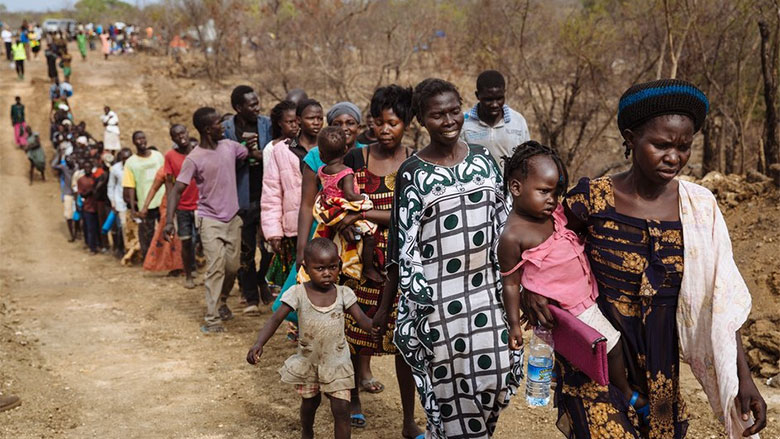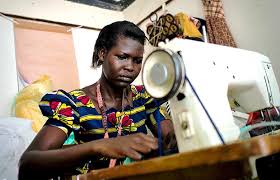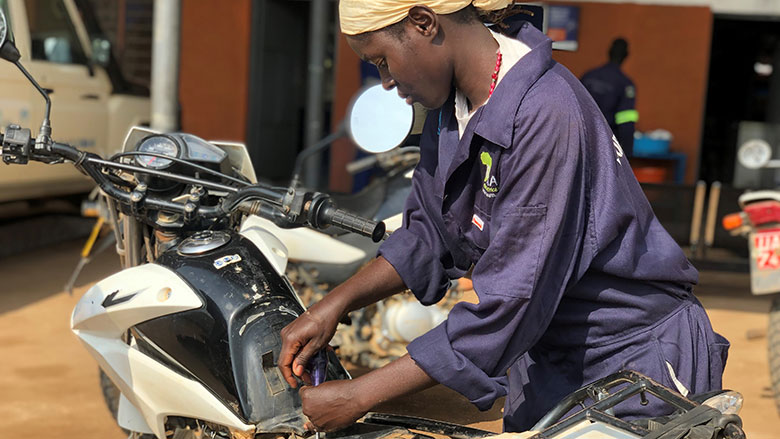On February 20-21, 2018, the UNHCR Representative in Uganda, Bornwell Kantande, officials from Uganda’s Comprehensive Refugee Response Framework (CRRF) Secretariat, and the WFP Country Director in Uganda, Elkhidir Daloum, led a delegation of bilateral donors and the World Bank for a two-day visit to Kyaka II Refugee Settlement.
The visit, the first of its kind in the Uganda operation, was aimed at involving development partners in the early stages of emergency response, by giving them the opportunity to conduct joint, impartial and rapid assessments, and to prioritize assistance for refugees and hosting communities, as well as national and local authorities. Six partners participated in the mission, representing Belgium, Germany, Japan, Netherlands, Sweden and the World Bank.
Welcoming the delegation, the Chief Administrative Officer for Kyegegwa District, Vhiona Sanyu appealed that the ongoing influx should not result in the quality of social services in the district deteriorating. “We do not differentiate between local people and refugees,” she said. “The ongoing influx has stretched the available social services to the limits both for refugees and the surrounding host communities. There is an urgent need for water, education manpower, and healthcare facilities, medicines, schools and livelihoods interventions.”
This year more than 42,000 people have crossed Lake Albert, bringing the total number of Congolese refugees in Uganda to over 251,000. UNHCR, OPM and partners are relocating new arrivals from Kisoro, Mitondo and Sebagoro to Kyangwali and Kyaka II Refugee Settlements in Mid-West Uganda, as well as providing protection and life-saving assistance and services.
Talking to refugees in Kyaka II, the UNHCR Representative explained the CRRF as a holistic and inclusive approach to support refugees and host communities. To the visiting delegation he said, “Uganda needs political and financial support from the international community to help maintain its generous approach towards refugees,” adding that sustainable socio-economic development is imperative to address the needs of the refugees and host communities.
Gracia Shante, a woman refugee leader, lamented the lack of medical services, which forces patients, including small children to seek treatment elsewhere. “Medicines are not enough,” she said. “We need more drugs so we can receive better treatment for the many diseases refugees here suffer from.”
Kwisanga Mizerreo, a refugee welfare leader said Kyaka II is overwhelmed by the sheer number of refugees flocking into Uganda. Himself a Congolese in his mid-forties, Mizerreo has for the past two years helped members of his community to identify their needs and engage in productive trade in order to thrive. He is concerned about the fate of the thousands of refugees who have recently arrived on fishing boats with very little or nothing other than the clothes on their backs and the skills they acquired back in DR Congo.
“In DRC were had different sources of livelihood.” he said. “We have carpenters, tailors, boda-boda riders, barbers and even graduates among us. We need livelihoods support and opportunities to train our youth in vocational skills.”
Envoys from the Kingdom of the Netherlands to Uganda said that donors are engaging humanitarian and development actors to address some of issues raised by the refugees during their visit to the settlement.
With some 1.4 million refugees from more than five countries, Uganda is the largest refugee hosting country in Africa and among the top five globally. The country continues to receive more refugees and asylum seekers from countries in East Africa and the Great Lakes region daily.
“Uganda is a unique model for refugee reception. We have an opportunity to make sure this model works, and CRRF is our opportunity,” said Elkhidir Daloum, WFP Country Director, pointing out that unlike refugees who live in camps in other countries, refugees in Uganda will return home, not only with their humanity intact, but with the ability and skills to contribute to their own countries.
“I call on everyone working on the refugee response in Uganda to live up to the highest standards of accountability, demonstrate our core values and continue putting the people we serve at the centre of what we say and do,” Daloum added.
The Government of Uganda has undertaken several initiatives to strengthen the refugee-hosting environment in its five-year National Development Plan. The UN Country Team and the World Bank are supporting the Government of Uganda through the Refugee and Host Population Empowerment (ReHoPE) strategy, which is integrated into the UN Development Assistance Framework for Uganda. These strategic initiatives are aligned with the Comprehensive Refugee Response Framework (CRRF) of the New York Declaration on Refugees and Migrants and require continued donor support.





























